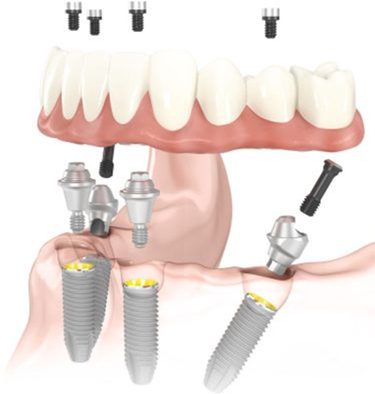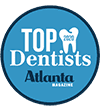All-on-4 implants are fixed implant dentures. A periodontist angles the rear implants up to forty-five degrees to increase implant stability and minimize the need for bone grafting. What can you expect after All-on-4 surgery?
What Can You Expect During All-on-4 Implants Recovery?

Follow your periodontist’s instructions for a smooth All-on-4 dental implants recovery
During All-on-4 dental implants recovery, you can expect to rest at home for forty-eight to seventy-two hours. Your periodontist (gum, teeth, and jawbone specialist) will instruct you to take medication to minimize discomfort. Also, you will eat soft foods throughout your recovery to avoid disturbing the implant sites. Still, you can enjoy your new smile while conscious that your gums and jawbone are still healing.
Immediately After Surgery
Immediately after All-on-4 surgery, a staff member will take you to a recovery room. They will give you post-operative instructions for recovering when you are stable at home.
Recovering at Home After All-on-4 Implants Surgery
Your recovery at home after All-on-4 surgery will include several factors:
Rest
Plan to rest at home for up to seventy-two hours after All-on-4 surgery. Resting allows blood clots to form at the implant sites, minimizes bleeding, and helps your body focus on healing. You can resume activity after the fourth day without strenuous work or exercise.
Managing Discomfort
- Swelling – You can experience moderate to significant healing after All-on-4 implant surgery as your body’s reaction to surgery and part of healing. Apply cold packs to the sides of your face in 15- to 20-minute intervals. Swelling will peak in two to three days. After the third day, only use warm compresses.
- Soreness – Control soreness with over-the-counter or prescription medication as your periodontist directs. Take medicine on time to minimize soreness. Give your periodontist a complete medication list before surgery to prevent medication conflicts. An article published by the American Academy of Implant Dentistry notes that many patients have minimal post-operative discomfort and take only one or two pills after implant placement.
- Bleeding – Mild bleeding around the implant sites is normal until blood clots form. You can control bleeding by applying gauze over the areas and biting gently for 30 minutes.
Oral Hygiene
A clean mouth is essential to prevent infection around your implants. For the first day after surgery, avoid rinsing your mouth. Afterward, you may do the following:
- Use a warm salt-water rinse.
- Rinse your mouth after meals, even if only plain water is available.
- Let the water run out of your mouth instead of spitting. Suction from spitting can dislodge blood clots.
- Avoid using a water flosser until your periodontist tells you it is safe.
Eating and Drinking
You will choose foods and beverages that promote healing and will not get stuck around the implant sites or dislocate implants. Follow these guidelines:
- On the day of surgery, you will drink liquids and avoid solid food.
- Avoid drinking through a straw for the first two days to prevent dislodging blood clots.
- For the first week, enjoy soft foods that do not require chewing.
- Progress to foods that require minimal chewing.
- Maintain a soft-food diet for three to four months as you heal to avoid disturbing the implants with chewing and biting forces.
- Avoid crunchy, sticky, chewy, hard, spicy, hot, and acidic foods.
- Avoid nuts, seeds, chips, and other foods that may break into pieces.
What kind of food can you eat?
- Soft fruits that do not contain seeds
- Well-cooked or pureed vegetables
- Soft, non-crumbly starches
- Flaky fish
- Pureed proteins that do not require chewing
Maintain good nutrition despite a temporary change in food texture for the safety of your implants. After the implants heal, you can eat whatever you want.
Avoid Smoking
Smoking will narrow your blood vessels and delay healing. Your jawbone and implants may fail to fuse.
Follow-Up Visits
Your periodontist will schedule project checks to examine your All-on-4 implants and gum tissue to ensure they are healthy and healing.
Conclusion
During All-on-4 dental implants recovery, you can expect to rest and avoid strenuous activity. Maintain good oral hygiene without disturbing your implants. Also, choose foods and drinks that will not irritate the implant sites. Follow-up visits with your periodontist will ensure your recovery is progressing well.
Atlanta periodontist Dr. David Pumphrey sponsors this post.







